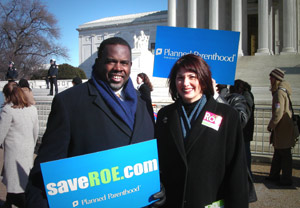Related Research Articles

The United States abortion-rights movement is a sociopolitical movement in the United States supporting the view that a woman should have the legal right to an elective abortion, meaning the right to terminate her pregnancy, and is part of a broader global abortion-rights movement. The movement consists of a variety of organizations, with no single centralized decision-making body.

In the United States, abortion is a divisive issue in politics and culture wars, though a majority of Americans support access to abortion. Abortion laws vary widely from state to state.
The abortion debate is a longstanding and contentious discourse that touches on the moral, legal, medical, and religious aspects of induced abortion. In English-speaking countries, the debate has two major sides, commonly referred to as the "pro-choice" and "pro-life" movements. Generally, supporters of pro-choice argue for the right to choose to terminate a pregnancy. They take into account various factors such as the stage of fetal development, the health of the woman, and the circumstances of the conception. By comparison, the supporters of pro-life generally argue that a fetus is a human being with inherent rights and intrinsic value, and thus, cannot be overridden by the woman's choice or circumstances and that abortion is morally wrong in most or all cases. Both terms are considered loaded words in mainstream media, where terms such as "abortion rights" or "anti-abortion" are generally preferred in order to avoid bias.

The Unborn Victims of Violence Act of 2004 is a United States law that recognizes an embryo or fetus in utero as a legal victim, if they are injured or killed during the commission of any of over 60 listed federal crimes of violence. The law defines "child in utero" as "a member of the species Homo sapiens, at any stage of development, who is carried in the womb."

The Silent Scream is a 1984 anti-abortion film created and narrated by Bernard Nathanson, a former abortion provider who had become an anti-abortion activist. It was produced by Crusade for Life, Inc., an evangelical anti-abortion organization, and has been described as a pro-life propaganda film. The film depicts the abortion process via ultrasound and shows an abortion taking place in the uterus. During the abortion process, the fetus is described as appearing to make outcries of pain and discomfort. The video has been a popular tool used by the anti-abortion campaign in arguing against abortion, but it has been criticized as misleading by members of the medical community.
The philosophical aspects of the abortion debate are logical arguments that can be made either in support of or in opposition to abortion. The philosophical arguments in the abortion debate are deontological or rights-based. The view that all or almost all abortion should be illegal generally rests on the claims that (1) the existence and moral right to life of human beings begins at or near conception-fertilization; that (2) induced abortion is the deliberate and unjust killing of the embryo in violation of its right to life; and that (3) the law should prohibit unjust violations of the right to life. The view that abortion should in most or all circumstances be legal generally rests on the claims that (1) women have a right to control what happens in and to their own bodies; that (2) abortion is a just exercise of this right; and that (3) the law should not criminalize just exercises of the right to control one's own body and its life-support functions.

The beginning of human personhood is the moment when a human is first recognized as a person. There are differences of opinion about the precise time when human personhood begins and the nature of that status. The issue arises in a number of fields, including science, religion, philosophy, and law, and is most acute in debates about abortion, stem cell research, reproductive rights, and fetal rights.

The legality of abortion in the United States and the various restrictions imposed on the procedure vary significantly, depending on the laws of each state or other jurisdiction, although there is no uniform federal law. Some states prohibit abortion at all stages of pregnancy, with few exceptions; others permit it up to a certain point in a woman's pregnancy, while some allow abortion throughout a woman's pregnancy. In states where abortion is legal, several classes of restrictions on the procedure may exist, such as parental consent or notification laws, requirements that patients be shown an ultrasound before obtaining an abortion, mandatory waiting periods, and counseling requirements.
John Peter Smith Hospital is a Level 1 Trauma Center, 573-bed county hospital located in Fort Worth, Texas that provides inpatient, outpatient and behavioral healthcare.

Stephen Edward Broden is an American businessman, pastor, political activist, broadcaster, and former professor from the state of Texas. In 2010, he was the Republican candidate for Texas's 30th congressional district for the United States House of Representatives. He was defeated by Democratic incumbent Eddie Bernice Johnson. He is the Constitution Party's candidate for vice president in the 2024 United States presidential election.
A six-week abortion ban, also called a "fetal heartbeat bill" by proponents, is a law in the United States which makes abortion illegal as early as six weeks gestational age, which is when proponents claim that a "fetal heartbeat" can be detected. Medical and reproductive health experts, including the American Medical Association and the American College of Obstetricians and Gynecologists, say that the reference to a fetal heartbeat is medically inaccurate and misleading, for a conceptus is not called a fetus until eight weeks after fertilization, as well as that at four weeks after fertilization, the embryo has no heart, only a group of cells which will become a heart. Medical professionals advise that a true fetal heartbeat cannot be detected until around 17 to 20 weeks of gestation when the chambers of the heart have become sufficiently developed.
Marlise Nicole Muñoz was an American woman at the center of a medical ethics controversy between November 2013 and January 2014. She suffered a suspected pulmonary embolism and was declared brain dead. Because she was pregnant, doctors at a Texas hospital kept her body on a ventilator in the intensive care unit despite the determination of brain death. Muñoz's husband entered a legal battle to have her removed from organ support. A Texas law restricts the application of advance directives in pregnant patients, but Muñoz's husband argued that the law was not applicable because his wife was legally dead. A judge ordered the hospital to remove organ support and her cardiac functions stopped on January 26, 2014.
Maternal somatic support after brain death occurs when a brain dead patient is pregnant and their body is kept alive to deliver a fetus. It occurs very rarely internationally. Even among brain dead patients, in a U.S. study of 252 brain dead patients from 1990–96, only 5 (2.8%) cases involved pregnant women between 15 and 45 years of age.
In 2015, an anti-abortion organization named the Center for Medical Progress (CMP) released several videos that had been secretly recorded. Members of the CMP posed as representatives of a biotechnology company in order to gain access to both meetings with abortion providers and abortion facilities. The videos showed how abortion providers made fetal tissue available to researchers, although no problems were found with the legality of the process. All of the videos were found to be altered, according to analysis by Fusion GPS and its co-founder Glenn R. Simpson, a former investigative reporter for The Wall Street Journal. The CMP disputed this finding, attributing the alterations to the editing out of "bathroom breaks and waiting periods". CMP had represented a longer version of the tapes as being "complete", as well as a shorter, edited version. The analysis by Fusion GPS concluded that the longer version was also edited, with skips and missing footage. Nonetheless, the videos attracted widespread media coverage; after the release of the first video, conservative lawmakers in Congress singled out Planned Parenthood and began to push bills that would strip the organization of federal family planning funding. No such attempts by Congress to cut federal family planning money from Planned Parenthood have become law. Conservative politicians in several states have also used this as an opportunity to cut or attempt to cut family planning funding at the state level.
Abortion in Texas is illegal in most cases. There are nominally exceptions to save the mother's life, or prevent "substantial impairment of major bodily function", but the law on abortion in Texas is written in such an ambiguous way that life-threatening or harmful pregnancies do not explicitly constitute an exception. Attempts to clarify and codify these exceptions into law have been rejected by Republican lawmakers in Texas.
As of 2024, abortion is illegal in Indiana. It is only legal in cases involving fatal fetal abnormalities, to preserve the life and physical health of the mother, and in cases of rape or incest up to 10 weeks of pregnancy. Previously abortion in Indiana was legal up to 20 weeks; a near-total ban that was scheduled to take effect on August 1, 2023, was placed on hold due to further legal challenges, but is set to take place, after the Indiana Supreme Court denied an appeal by the ACLU, and once it certifies a previous ruling that an abortion ban doesn't violate the state constitution. In the wake of the 2022 Dobbs Supreme Court ruling, abortion in Indiana remained legal despite Indiana lawmakers voting in favor of a near-total abortion ban on August 5, 2022. Governor Eric Holcomb signed this bill into law the same day. The new law became effective on September 15, 2022. However, on September 22, 2022, Special Judge Kelsey B. Hanlon of the Monroe County Circuit Court granted a preliminary injunction against the enforcement of the ban. Her ruling allows the state's previous abortion law, which allows abortions up to 20 weeks after fertilization with exceptions for rape and incest, to remain in effect.
Abortion in Ohio is legal up to the point of fetal viability as a result of abortion rights being placed into the Ohio State Constitution by November 2023 Ohio Issue 1.
Abortion in South Carolina is illegal after detection of a "fetal heartbeat", usually around 6 weeks from the woman's last menstrual period, when many women are not yet aware that they are pregnant. On May 25, 2023, Governor Henry McMaster signed a 6-week ban, and it took effect immediately. The ban was indefinitely blocked in court on May 26, and reinstated by the South Carolina Supreme Court on August 23.
Abortion in Tennessee is illegal from fertilization and provides no exceptions for rape, incest or the health of the pregnant individual. Tennessee's abortion legislation provides no explicit exceptions for the pregnant patient’s health. It makes an exception for an “affirmative defense” for emergencies, but the vagueness of what constitutes an emergency means that physicians hesitate to provide abortions even when the pregnant individual's life is in jeopardy. Attempts to codify the exceptions into law have been rejected by Republican politicians in Tennesse. Tennessee is among the four states which forbid abortion access through their state constitution; alongside Alabama, Louisiana, and West Virginia.
Matthew Haston Krause is an American attorney and politician who served as a member of the Texas House of Representatives from the 93rd district from 2013 to 2023. He is a member of the Republican Party.
References
- 1 2 3 4 Brittney Martin, Anti-abortion groups' political endorsement differences show power struggle in Texas GOP, Dallas News (February 2016).
- 1 2 About Us: Mission Statement, Texas Alliance for Life (accessed April 8, 2017).
- 1 2 Brad Kennedy, Leader against abortion is under attack from the right, Fort Worth Star-Telegram (September 23, 2016).
- ↑ Staff reports, Founder of Texas Alliance for Life to speak to Denton Republican Women, Lewisville Reader (January 19, 2016).
- ↑ Lobbyists Directory, Texas Ethics Commission (search for Joseph Pojman).
- ↑ Shefali Luthra, Visibility Climbs for Groups on Both Sides of Abortion Debate, Texas Tribune (July 23, 2013).
- ↑ J. David McSwane, Texas abortion law upheld by federal court, Austin American-Statesman (June 9, 2015).
- ↑ Alexa Ura, U.S. Supreme Court Overturns Texas Abortion Restrictions, Texas Tribune (June 27, 2016).
- ↑ Alexa Ura & Aneri Pattani, Divided Anti-Abortion Groups Map New Strategies, Texas Tribune (July 7, 2016).
- 1 2 Patrick Svitek, Cruz's Planned Parenthood Offensive Divides Texas Anti-Abortion Forces, Texas Tribune (September 29, 2015).
- ↑ Nicole Chavez, Anti-abortion rally at Texas Capitol targets Planned Parenthood, Austin American-Statesman (July 28, 2015).
- ↑ Becca Aaronson * Audrey White, Abortion Opponents Back Fetal Pain Bill, More Physician Restrictions, Texas Tribune (November 23, 2012).
- 1 2 Alexa Ura, In a More Conservative Legislature, Few Anti-Abortion Bills Passed, Texas Tribune (June 2, 2015).
- ↑ Marissa Evans, State officials hear more testimony on fetal remains rule, Texas Tribune (November 9, 2016).
- ↑ Alexa Ura, Sharp Disagreements at Fetal Remains Hearing, Texas Tribune (August 4, 2016).
- ↑ Alexa Garcia-Ditta & Andrea Grimes, Who's the 'Life' of the Party?: Anti-abortion infighting makes for mud-slinging Texas House races in the Republican primary, Texas Observer (February 23, 2016).
- ↑ Kennedy, Bud (10 January 2014). "Marlise Muñoz and the politics of life and death in Tarrant County, Texas". Star Telegram. Retrieved 26 January 2014.
- ↑ Dart, Tom (24 January 2014). "Texas hospital acknowledges brain-dead status of pregnant woman". The Guardian. Retrieved 25 January 2014.
- ↑ Luscombe, Belinda. "Why the Dad Has No Say in Tragic Texas Brain Death Case". Time. Retrieved 25 January 2014.
- ↑ Bazelon, Emily. "Brain-Dead Marlise Munoz's Fetus Is "Distinctly Abnormal." Please, Texas, Let This Nightmare End". Slate.com. Retrieved 25 January 2014.
- ↑ "Brain-dead Tarrant woman's fetus is 'distinctly abnormal,' attorneys say". The Associated Press/ The Dallas Morning News. Retrieved 25 January 2014.
- ↑ Max B. Baker and Elizabeth Campbell. "Texas law didn't anticipate Muñoz case, drafters say". star telegram. Retrieved 25 January 2014.
- ↑ "Family cries as judge rules Munoz off life support". USA Today. Retrieved 25 January 2014.
- ↑ Megan Greene and Leslie R. Wolfe. "REPRODUCTIVE LAWS FOR THE 21 ST CENTURY PAPERS CENTER FOR WOMEN POLICY STUDIES:Pregnancy Exclusions in State Living Will and Medical Proxy Statutes" (PDF). Center for Women Policy Studies in Washington. Archived from the original (PDF) on 24 January 2014. Retrieved 26 January 2014.
- ↑ Koppel, Nathan. "Texas Judge Orders Pregnant Woman Removed From Life Support Family Said Hospital Kept Her Alive Against Her Wishes". WSJ. Retrieved 26 January 2014.